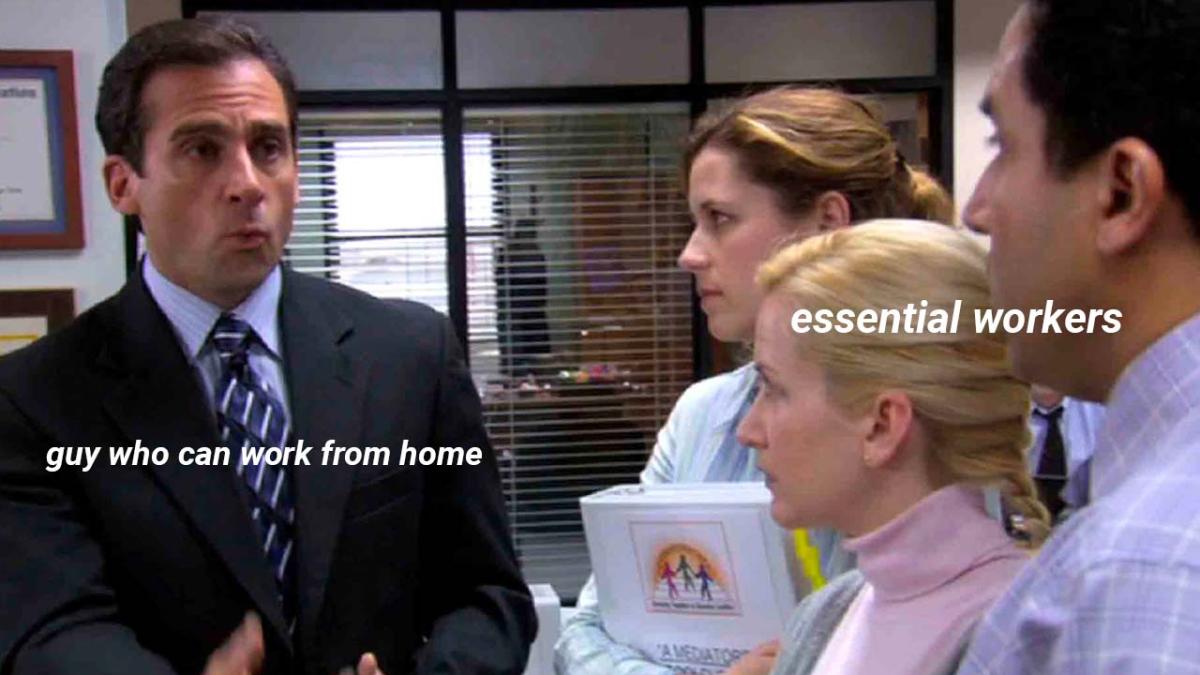
In an era of statewide lockdowns, at-home working environments, and races to get the nation vaccinated, it can be hard to know what your rights are as an employee.
Last week, we asked you on Instagram to send in your COVID-related legal questions. We’ve previously explored what the law says is the difference between an intimate partner and single bubble buddy and what you can and can’t do when you are given a lockdown fine, but let’s get into all the workplace-related ones.
Can a workplace mandate staff get vaccinated and take a COVID test? Can a workplace legally disclose whether its staff is vaccinated? What are your rights as someone who is working from home? To answer these pressing q’s and more, PEDESTRIAN.TV spoke to Sydney criminal justice lawyer and frequent TikTok Live legal expert Jahan Kalantar.
Can my work mandate I get a COVID vaccine?
According to Kalantar, employers can only require their employees to be vaccinated where:
- A specific law (such as a state or territory public health order) requires an employee to be vaccinated.
- The requirement is permitted by an enterprise agreement, other registered agreement, or employment contract.
- It would be lawful and reasonable for an employer to give their employees a direction to be vaccinated, which is assessed on a case-by-case basis.
State and territory governments have made and may make public health orders requiring workers to be vaccinated against COVID-19 in their state or territory and if so, employers and workers need to comply with any public health orders that apply to them.
According to public health orders by the NSW government, the following workers are required to have received a COVID-19 vaccination:
- Quarantine, transport, and airport workers, per the NSW Airport and Quarantine Vaccination Program.
- Authorised workers leaving an area of concern of work (from 6 September 2021).
- Construction workers who live in an area of concern.
- Certain early education and care facility workers and disability support workers who live or work in an area of concern (from 6 September 2021).
“If an employee refuses to be vaccinated, an employer should, as a first step, ask the employee to explain their reasons,” Kalantar explained.
“If the employee gives a legitimate reason such as having an existing medical condition, the employee and employer should consider whether there are any other options available instead of vaccination.
“Again, this is a very complicated question, but employers can direct their employees to be vaccinated if the direction is lawful and reasonable. Whether a direction is lawful and reasonable will be fact-dependent and needs to be assessed on a case-by-case basis. This is an evolving situation and specific advice should be sought for each and every person.”
Can my work mandate I get a COVID test?
According to Kalantar, some industries and employers have introduced regular testing as part of their workplace safety measures. These may include a quick COVID test process known as rapid antigen testing, with results available in 15 to 20 minutes.
“There are also tests that are required by the NSW government, such as living in Greater Sydney,” he said.
“You must have a COVID test in the 7 days before working if your workplace is 50km or more outside Greater Sydney.
“Workplaces can give a direction that you have a COVID test as part of their COVID safe plan and the lawfulness of that direction needs to be assessed on a case by case basis.”
Say someone finds that their workplace is breaching stay-at-home rules or is forcing them to go to work in-office, what can they do?
“If your employer is forcing you to work, you can as a first step, start a conversation with them and ensure they know about the repercussions and what the law is saying,” Kalantar said.
“You also have a right to feel safe at work and you can report them to SafeWork, The Fair Work Ombudsman, and potentially the Fair Work Commission. You should not be going to work if it is unsafe or if the work can be done from home safely.”
What rights do you have when working from home?
If you are working from home, your employer should:
- Provide guidance on what is a safe home office environment, including what a good workstation setup looks like.
- Require you to familiarise yourself and comply with good ergonomic practices, for example by providing a self-assessment checklist.
- Maintain daily communication with you and your co-workers.
- Provide continued access to an employee assistance program (EAP).
- Appoint a contact person in the business that you and your co-workers can talk to about any concerns.
“Your employer must consult with you, other workers at your workplace, and elected Health and Safety Representatives (HSR) on working from home arrangements,” he said.
“You are also entitled to the same breaks as you would be in your office environment.”
Is it legal for an essential workplace to disclose whether their staff is vaccinated?
According to Kalantar and per the Office of the Australian Information Commissioner: “In limited circumstances, your employer may be able to require you to disclose information about your vaccination status without consent if the collection of this information is required or authorised by law.
“If your employer requests your consent to collect vaccination status information, they are required to be transparent about why the information is being collected. Generally, your employer must seek your consent to collect your vaccination status information and the collection of this information must be reasonably necessary for one or more of your employer’s functions or activities unless an exception applies.
“The health and safety risks in your work sector, applicable workplace laws, and contractual obligations will impact whether the collection of your vaccination status information is reasonably necessary for your employer’s activities or functions. If your employer is requiring you to disclose information about your vaccination status on a ‘just in case’ basis, or if they can achieve their purpose without collecting this information, it will be harder for them to demonstrate that the collection is reasonably necessary.
“Essentially, given the current health orders, I believe that such a direction in some circumstances is lawful in relation to vaccination status. This is bizarre because health status is usually a matter which you are under no obligation to disclose to an employer and may lead to a potential discrimination case in certain circumstances.”
Can a workplace choose to not disclose whether a work colleague has tested positive for COVID-19 and can it continue to stay open if it is essential?
There are two ways a business might be informed of a COVID-19 link:
- Being notified by public health authorities or an employee.
- Other contractors notifying that they have been diagnosed.
Once you have been notified of a COVID-19 link to your business:
- You will be put in contact with your local Public Health Unit.
- Your Public Health Unit will advise you on the type of contact tracing needed.
- You will be required to advise staff, visitors, contractors, and customers of the situation.
- You will be informed of any infection control measures you need to take.
Businesses and premises do not necessarily have to close after a case has been notified. This will depend on whether:
- The premises are being appropriately cleaned.
- The Public Health Unit is satisfied that there is no ongoing risk.
- There is business access to available staff.
“There has to be a COVIDsafe plan in place and there needs to be a strategy to protect other employees and the general public,” he explained.
“It is important to note that this procedure is essentially no different from the procedure that was in place for notifiable diseases prior to Covid such as whooping cough, measles, or TB.
“If someone was found to have any notifiable disease then their contacts had to be informed, contact tracing was done and if for example, they had been attending work then that workplace would be informed, and depending on the disease and length of exposure that location may have had to be deep cleaned. The only real difference now is that the contact tracing process has been streamlined and because of the more infectious nature of covid there is more need for that cleaning and isolation.”
Can you be fined for parking during a lockdown?
While not necessarily a workplace-related question for people who are working from home, getting a parking fine is still an issue for anyone who still has to work in an out-of-home capacity and drives. Likewise, residents who live in the city and own a car but no personal parking space have to continuously move their vehicle or risk a fine.
With that said, would it be fair to fine them when they aren’t allowed to go beyond their home for anything but work and essentials? According to Kalantar, unfortunately, yes, but it’s an issue he and his team have seen as at times fair and unfair.
“It has been noted that City of Sydney is unable to provide free parking permits for all city workers as this would result in unmanageable parking pressure and generate a significant increase in traffic congestion as cars circle looking for parks,” he explained.
“It has been said that they need to enforce parking restrictions to ensure our limited street parking is fairly distributed.
“Unfortunately, our experience has been that people are still receiving fines at the moment for a variety of reasons both fair and unfair.”
All adult Aussies (yep, even if those of us under 40) are currently able to get vaccinated against COVID-19. Click here to see which clinics are offering it, and talk to a doctor for more info.
The best vaccine is the first one you can get, and that’ll be our ticket out of this mess.



